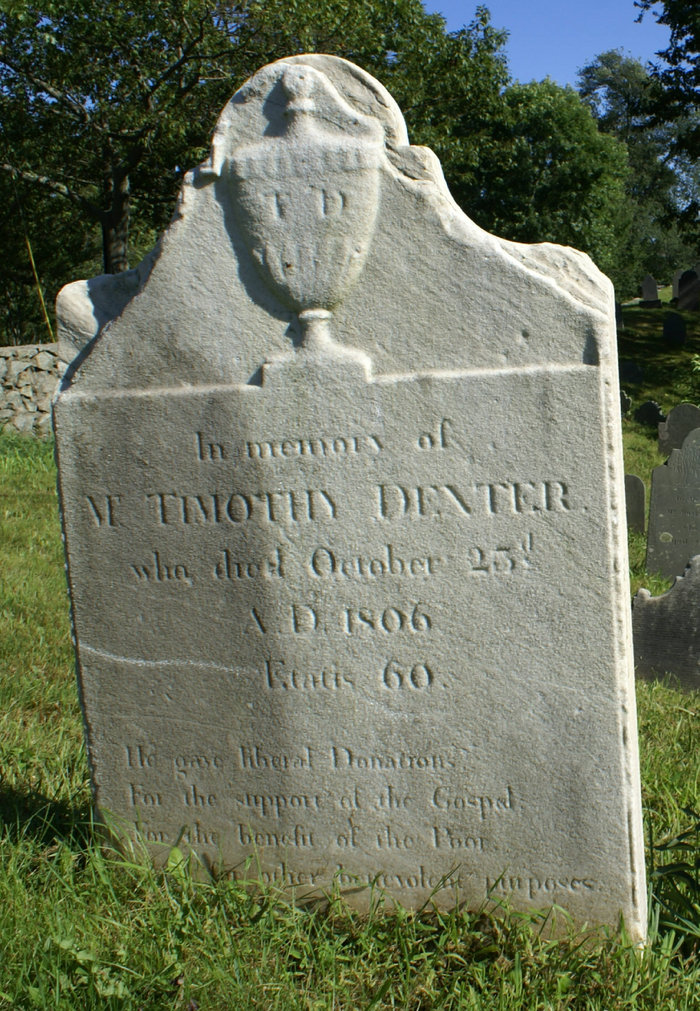What do wool mittens, coal, whales, Bibles, and stray cats have in common?
They all made American businessman Timothy Dexter an absolute FORTUNE...in ways you just won't believe.
A story on the "luckiest millionaire to ever live":
They all made American businessman Timothy Dexter an absolute FORTUNE...in ways you just won't believe.
A story on the "luckiest millionaire to ever live":

Our (hilarious) tale begins in 1775 at the start of the American Revolutionary War.
The Continental Congress began printing its own currency to fund war efforts against Great Britain called the Continental.
The only problem?
The Continental was pretty much worthless.
The Continental Congress began printing its own currency to fund war efforts against Great Britain called the Continental.
The only problem?
The Continental was pretty much worthless.

Why was it worthless, you ask?
First, it wasn't backed by anything, like gold or the trust of a central bank.
Second, there were too many of them; Congress kept printing and printing...and printing.
Such drastic depreciation gave birth to the phrase "not worth a Continental."
First, it wasn't backed by anything, like gold or the trust of a central bank.
Second, there were too many of them; Congress kept printing and printing...and printing.
Such drastic depreciation gave birth to the phrase "not worth a Continental."

Now enter Massachusetts native Timothy Dexter, who dropped out of school at the age of 8.
When Dexter began BLINDLY buying Continentals for FRACTIONS of pennies on the dollar in the 1780s, people laughed at him.
But boy oh boy would it be Dexter that'd have the last laugh...
When Dexter began BLINDLY buying Continentals for FRACTIONS of pennies on the dollar in the 1780s, people laughed at him.
But boy oh boy would it be Dexter that'd have the last laugh...
By the 1790s, after the US Constitution was ratified, Continentals could now be traded for treasury bonds at 1% of face value.
Dexter's Continentals were now worth hundreds of times more than what he had paid for them.
So what'd Dexter do?
He cashed out.
Big time.
Dexter's Continentals were now worth hundreds of times more than what he had paid for them.
So what'd Dexter do?
He cashed out.
Big time.
Onlookers were struck with envy.
How could a moron - without any education or business experience - buy a worthless currency and sell it for four-digit returns years later?
Out of spite, they maliciously convinced Dexter to enter a new venture:
Bed warmers.
How could a moron - without any education or business experience - buy a worthless currency and sell it for four-digit returns years later?
Out of spite, they maliciously convinced Dexter to enter a new venture:
Bed warmers.

Before the advent of modern-day heaters, people would fill these metal pans with embers to warm their beds during cold winter nights, perfect for a cold place like Massachusetts.
But for the sunny, tropical West Indies?
Not so much.
But for the sunny, tropical West Indies?
Not so much.

So when the gullible Dexter was talked into buying and shipping 42,000 (!) bed warmers to the Caribbean, it seemed as if he'd lose his fortune.
But when the heaters arrived, they were soaked up by local molasses manufacturers who used them as LADLES.
Dexter struck gold.
Again.
But when the heaters arrived, they were soaked up by local molasses manufacturers who used them as LADLES.
Dexter struck gold.
Again.

People in the West Indies sure must be freezing, Dexter thought..so why not send them more cold-weather accessories?
Well, he did.
And Dexter's shipment of WOOL MITTENS to the Caribbean luckily arrived the same day an expedition to Siberia was departing.
Dexter made a fortune.
Well, he did.
And Dexter's shipment of WOOL MITTENS to the Caribbean luckily arrived the same day an expedition to Siberia was departing.
Dexter made a fortune.

The story goes on.
Newcastle, across the pond, was one of the biggest coal producers in the world at the time.
So when Dexter was persuaded into shipping tons of coal there, one would think that it'd be sent back and that finally, Dexter would lose his fortune.
Think again.
Newcastle, across the pond, was one of the biggest coal producers in the world at the time.
So when Dexter was persuaded into shipping tons of coal there, one would think that it'd be sent back and that finally, Dexter would lose his fortune.
Think again.

Dexter's shipment arrived AT THE EXACT SAME TIME local Newcastle coal miners went on strike.
Dexter's coal?
Bought at an absurd premium.
Dexter's coal?
Bought at an absurd premium.
By this point, Dexter was just having fun.
For shits and giggles, he began buying whale baleen: the keratin, teeth-like plates whales have to catch and eat their food.
But Dexter just didn't buy one baleen here, one baleen there.
He hoarded it to the tune of 340 TONS.
For shits and giggles, he began buying whale baleen: the keratin, teeth-like plates whales have to catch and eat their food.
But Dexter just didn't buy one baleen here, one baleen there.
He hoarded it to the tune of 340 TONS.

And as luck would have it, baleen became the preferred material to make high-end corsets in 18th Century America.
Dexter?
He was one of New England's biggest holders.
He sold his stash for a 75% markup.
Dexter?
He was one of New England's biggest holders.
He sold his stash for a 75% markup.

Then, Boston became infested with feral cats.
Dexter, as any sane businessman would, herded them like sheep and ended up accumulating quite a number of strays.
Dexter, as any sane businessman would, herded them like sheep and ended up accumulating quite a number of strays.
And soon after, when the West Indies had a pest problem, Dexter had a cat solution:
Think: Tom and Jerry.
He shipped cats in DROVES to the Caribbean, as they would chase off the islands' rodents...all for a pretty penny.
Think: Tom and Jerry.
He shipped cats in DROVES to the Caribbean, as they would chase off the islands' rodents...all for a pretty penny.

“I found I was very lucky in spekkelation,” the illiterate Timothy Dexter wrote.
Lucky indeed.
And so with all of Dexter's luck came more money.
And with more money eventually came...power.
Lucky indeed.
And so with all of Dexter's luck came more money.
And with more money eventually came...power.

Dexter bought 21,000 Bibles for 41 cents each, only to sell them in the West Indies for a whopping $47,000.
How'd he do it?
He wrote a letter:
“I sent a text that all of them must have one bibel in every familey or if not thay would goue to hell."
How'd he do it?
He wrote a letter:
“I sent a text that all of them must have one bibel in every familey or if not thay would goue to hell."
But as Dexter amassed more and more wealth, he still wasn't accepted amongst the higher echelons of New England society.
To try and fit in, he collected art...he erected statues...all to no avail.
The solution?
Call himself..."Lord" Timothy Dexter.
Still, no one bought it.
To try and fit in, he collected art...he erected statues...all to no avail.
The solution?
Call himself..."Lord" Timothy Dexter.
Still, no one bought it.
In one last attempt for "Lord" Timothy Dexter to be taken seriously, he wrote a book titled "A Pickle for the Knowing Ones".
Riddled with spelling errors and devoid of ANY punctuation marks, Dexter wrote pompously and proclaimed himself as "the first Lord in the younited States"
Riddled with spelling errors and devoid of ANY punctuation marks, Dexter wrote pompously and proclaimed himself as "the first Lord in the younited States"

Aside from reference "Addom & Eve", the Lord also paid tributes to his "father Jorge Washington the grate herow 17 sentreys past". 

But perhaps the best part about "A Pickle for the Knowing Ones" was the addendum Dexter added in the book's second edition after readers complained it was hard to read without any punctuation...
Simply inserting a page of apostrophes, periods, colons, and exclamation points on one page, Dexter figured that he:
"put in A Nuf here and that may peper and solt it as they plese"
Translation: he encouraged his readers to "salt and pepper" his book with punctuation.
"put in A Nuf here and that may peper and solt it as they plese"
Translation: he encouraged his readers to "salt and pepper" his book with punctuation.

Whilst Lord Timothy Dexter died in 1806, perhaps there's a lesson to be had in all of his wheeling...dealing...and authoring over two centuries ago... 

No, it's not that we should BLINDLY trade strange currencies or HODL whale baleens.
It's that if people roll their eyes at our success - even if untraditional - then we should return their envy with a wink and an exclamation point.
And let them solt and peper it as they please
It's that if people roll their eyes at our success - even if untraditional - then we should return their envy with a wink and an exclamation point.
And let them solt and peper it as they please
Find this story ridiculous?
Then you may find this one even more so...the time a British author got his (fake) restaurant to be the #1 listed restaurant in all of London:
Then you may find this one even more so...the time a British author got his (fake) restaurant to be the #1 listed restaurant in all of London:
https://twitter.com/DavidZabinsky/status/1466745638083776517?s=20
• • •
Missing some Tweet in this thread? You can try to
force a refresh




















